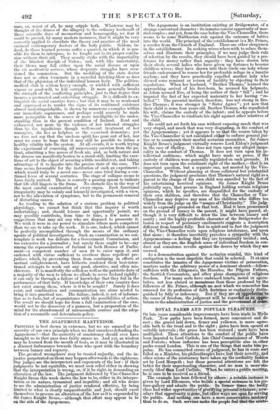THE AGAPEMONE MARTYRDOM.
Pars/mem is best shown in extremes, but we are amazed at the severity of our own principle when we find ourselves defending the Agapemone !—that the austerity of consistency should ever have brought us to that pass does fairly amaze us. And yet, as wisdom may be learned from the month of fools, so it may be illustrated in a discreet forbearance towards those who sport with the boundary between lunacy and roguery.
The greatest wrongdoers may be treated unjustly, and the in- justice perpetrated on them may happen afterwards to the righteous. Our judges are the interpreters and exponents of the law : if their judgments be not equitable, we must seek relief either in showing that the interpretation is wrong, or, if it be right, in demanding an alteration Gale law. -The judgment delivered. by Vice-Chancellor Knight Bruoe.this week shows the law to be, either in its interpre- tation or its nature, tyrannioal and impolitio ; and all who desire to see the administration of justice rendered effective, by being limited to what is clearly unquestionable 'and just, should exert themselves to procure an alteration of the Law as it is expounded by Sir jaws Knight Bruce,—although that effort may appear to be on the side of the Agapemone. The Agapemone is an institution existing at Bridgewater, of a strange conventual character : its inmates consist apparently of mar- ried couples ; and yet, from the case before the Vice-Chancellor, there seems to be some Malthusian rule against the entrance of babies into the world. The principal of the establishment is a Mr. Prince, a seceder from the Church of England. There are other clergymen in the establishment. In seeking wives wherewith to solace them- selves and illustrate their principles, if we may judge their rule of selection by the results, they should have been guided by a pre- ference for money rather than sagacity : they have drawn into their abode several ladies who have given up. fortunes to become childless wives; they have drawn into their circle one lady whose friends endeavoured to rescue her for preferable refuge in a lunatic asylum; and they have practically expelled another lady who showed some remnant or return of lucidity by objecting to their regulations. When her husband, " Brother Thomas," learned the approaching arrival of his first-born, he accused his helpmate, as Adam accused Eve, of being the author of their " fall"; and he imputed the fact of her expected maternity to her having "re- belled" ! The parental instinct, therefore, was not strong in Bro- ther Thomas; it was stronger in " Sister Agnes" ; yet now that their child is some four years old, Brother Thomas, who repudiated his wife, claims the custody of the infant; and he appears before the Vice-Chancellor to -vindicate his right against other relatives of the child.
He could not set forth his case without exposing much that was very stupid, and much that was very disgusting, in the conduct of the Agapemonians ;yet it appears to us that the course taken by . the Vice-Chancelloris not calculated either to enforce general jus- tice or to counteract their morbid sectarian enormities. Sir James Knight Bruce's judgment virtually renews Lord Eldon's judgment in the case of Shelley. It does not turn upon any alleged imp- relay in the conduct of Thomas. It does not turn upon his in- tellectual unfitness; which might have made us pause, if the custody of children were generally regulated on such grounds. It does not turn upon the coordinate right of the mother,—that is, an important question, but a separate one, not mooted by the Vice- Chancellor. Without glancing at those collateral but substantial questions, the judgment proclaims that Thomas's natural right as a parent to the charge of his own child was annulled by the fact of his entertaining heretical opinions. Sir James Knight Bruce judicially says, that persons in England holding certain religious opinions, which he specifies, are disqualified for the custody 'of their own children, and therefore that the Chancellor or Vice- Chancellor may deprive any man of his children who differs too widely from the judge on the "-usages of Christianity." The judg- ment is expressly grounded on that test. Had it been pronounced on the ground of lunacy in the parent, it might have passed, al- though it is very difficult to draw the line between lunacy and sanity ; and the highly profitable character of the Bridgewater de- lusion in respect of• emoluments suggests a description different from lunatic folly. But in spirit and in fact the judgment of the Vice-Chaneellor rests upon religious intolerance, and upon that alone : it therefore inevitably provokes a sympathy with the Agapemonians—a feeling that they are tyrannically treated ; and, absurd as they are, the English sense of individualih.;.om in con- duct and conscience revolts against the decree by which they are coerced.
As a demonstration against the sectarian scandal, this kind. of castigation is the most iimpolitic that could be selected. It at once constitutes the inmates of the Agapemone victims of persecution, martyrs under the arbitrary power of a dominant church—fellow- sufferers with the Albigenses, the Hussites; the Pilgrim Fathers, the Scottish Covenanters, and other pious champions of religious freedom. For many sects have embraced tenets, moral or specu- lative, not less absurd. or monstrous than those professed by the followers of Mr. Prince, although no sect which we remember has amassed for its profession of faith doctrines so exclusively distin- guished by folly or indecency. But if they are an opprobritun'to the cause of freedom, the judgment will be regarded as an oppro- brium to the administration of justice and the government of order.


























 Previous page
Previous page